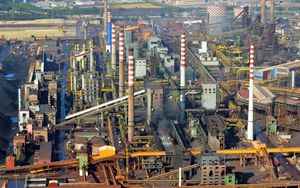(Finance) – The unitary works council of the factory’s Rsu delegates from Fim, Fiom, Uilm and Usb Steelworks of Italy from Taranto has announced one for next May 6 strike of 24 hours of direct workers, of Ilva in As and of the contract, to ask the government and the company “answers concrete on environmental, employment and industrial issues “. The decision was taken after a series of meetings started with the workers following the failure to agree on extraordinary layoffs for restructuring initiated by the company on 28 March last for a maximum of three thousand workers in all the group’s sites, of which 2,500 in Taranto.
“We started a path – underlined the trade unions – which will see us involved in the territory in a series of initiatives and mobilizations to put an end to the dispute ex Ilva “. With the 24-hour strike, the unions also intend to” initiate a table permanent at Ministry of Economic Development that definitively clarifies the future of thousands of workers “.” The May 6 it will be an opportunity to return to being protagonists of change because we do not intend to give up the possibility of building a sustainable future also from a social point of view “, explain the workers’ representatives.
The acronyms metalworkers they then invited “all the workers to participate in the strike with garrison in front of the porters and then to reach the C porco merci”. For Fim, Fiom, Uilm and Usb, “time passes inexorably between ads And slogan on the part of politics and the Government with continuous postponements and uncertainties, not least the report of non-agreement on the extraordinary layoff which negatively marked the continuation of a negotiation very complex, above all due to the lack of clarity on the future prospects of the group regarding the environmental, employment and industrial issues “.
“It is no longer conceivable that we discuss transition ecologicaldecarbonisation, long-term hydrogen plants without addressing the many on the merits critical issues that concern the present of the factory and how this phase should be managed, avoiding that the workers continue to always pay “, concluded the unions.
